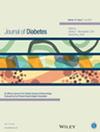This study aims to explore the link between iron deficiency anemia (IDA) and diabetic kidney disease (DKD) and assess the safety of iron supplementation. It also investigates key mechanisms and molecules involved in iron deficiency's role in disease development.
A retrospective analysis was conducted on 1,398 T2DM patients using propensity score matching to identify risk factors for DKD. Mendelian randomization (MR) was used to explore causal relationships between IDA, iron supplementation, liver iron content, and DKD. The GSE27999 dataset was analyzed to examine how an iron-deficient diet affects kidney-related gene expression. Key pathways and molecules were identified through GSEA, GO/KEGG, and PPI analysis.
Retrospective data showed a correlation between hemoglobin levels and DKD risk. Logistic regression confirmed that IDA increased DKD risk independently of other factors. MR revealed a causal link between IDA and DKD, with no significant effect from iron supplementation. GSE27999 analysis identified 580 differentially expressed genes, enriched in pathways like cytokine signaling, oxidative biology, and small molecule transport. PPI analysis highlighted 10 key hub genes, including Cyp2d26 and Fgf4.
IDA increases susceptibility to DKD, possibly through oxidative stress and altered small molecule transport. However, iron supplementation does not appear to increase the risk of DKD.



